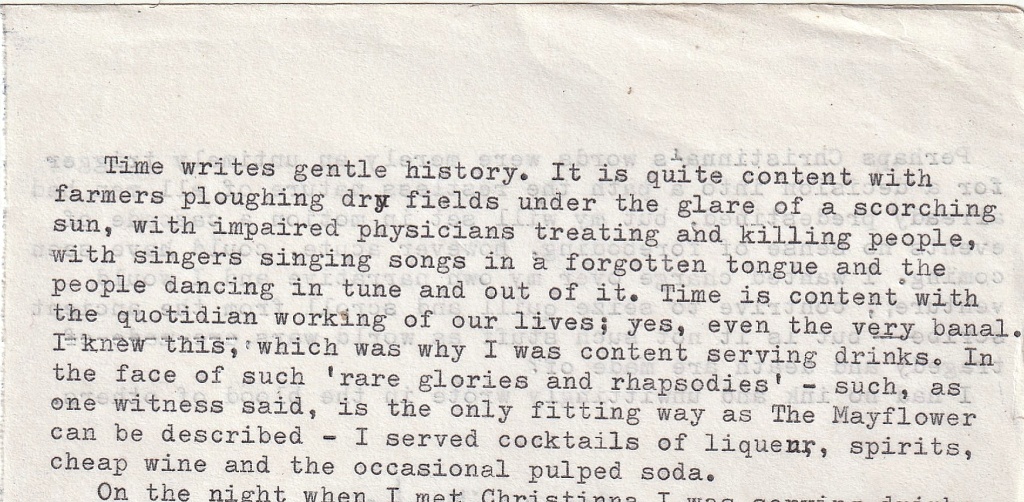The patrons pass through its doors,
in and out, to and fro
like pollen in mating season
The Mayflower,
under the March moon
looked like something blooming.
HER OWN ANTHOLOGY: A Life in Poems, Christinna
Time writes gentle history. It is quite content with farmers ploughing dry fields under the glare of a scorching sun, with impaired doctors treating and killing people, with singers singing songs in a forgotten tongue and the people dancing in tune and out of it. Time is content with the quotidian working of our lives; yes, even the very banal. I knew this, which was why I was content serving drinks. In the face of such ‘rare glory and rhapsodies’ – such, as one witness said, is the only fitting way as The Mayflower can be described – I served violent cocktails of liqueur, spirits, cheap wine and the occasional pulped soda.
On the night when I met Christinna I was serving drinks. ‘I am not interested in your booze, Mr. Bartender,’ she had told me, all puckered and defiant, ‘I want to witness everything and everything through clear eyes that I may remember my own experience.’ Thus I was inclined to indulge her on the occasional pulped soda— but there is a prevailing belief amongst most people that bartenders possess some sort of esoteric cognizance of things, Christinna believed it too. She assaulted me with questions, but, like the many others before her, she soon realised that I was a rather inept bartender. Customarily, upon arriving at this realisation, my disappointed charges quietly left me or murmured as they left, but that would not be Christinna. [Christinna was one of the odd ones—so bohemian; she would say things at the risk of being rude. She was a remorseless woman of violent opinions, and when she spoke to people she did so like she had known them all her life. Christinna was the absolute delight of Mrs. Julianna.] She had words for me: ‘How shocking is it that a person could be thrust in the middle of so much glory and life – the making of a peculiar history – and still miss it? How is it, Mr. Bartender?’
It was not so much her words that thwarted me as the sulky contempt in her eyes, that feminine look of disbelief commingled with disappointment that only men see in their women when they make wrong turns or fail in their perception of things. I doubt I should ever be able to forget it.
Christinna’s words turned themselves over and over in my head, it felt like poison. Her words sparked in me no swift will, no momentous decision, instead it rotted like leaves, festered like an open wound, till I misunderstood it. Then was my decision swift: I was going to write myself, somewhere, into this ‘glory and life and rhapsody’ that was The Mayflower. Perhaps Christinna’s words were merely an untimely trigger for a decision into a path the restless nature of all men had already predestined, but my will set in motion a cascade of events so severe no sense of foreboding, however acute, could have seen coming. I wanted charge over my own narrative and I would venture, contrive, to seize quill and scroll from the ancient scribe— and is this not such stuff as world wars, tragedy and death are made of?
I had no ink and, unwittingly, I wrote in the blood of others.

— To The God of Things
— To Christinna, and all that she was
[Gentle reader, you will do well to remember that it is here, in The Mayflower, that such wonderful folks as Mr. Camera, Mrs. Julianna, Tendre, Mr. Mossowalli and the others found and spent their muse.]

